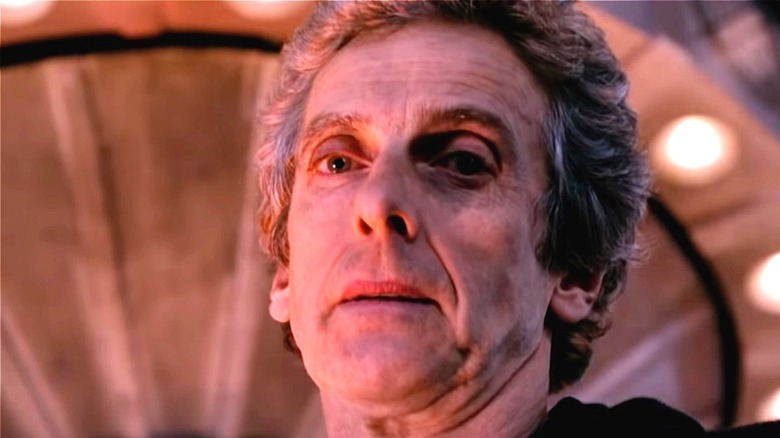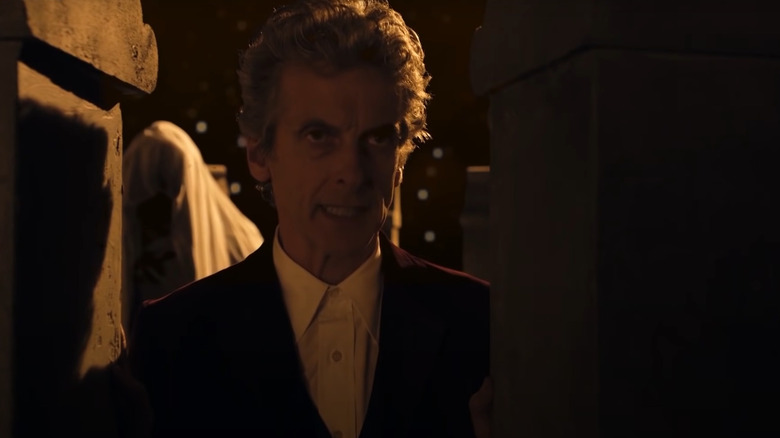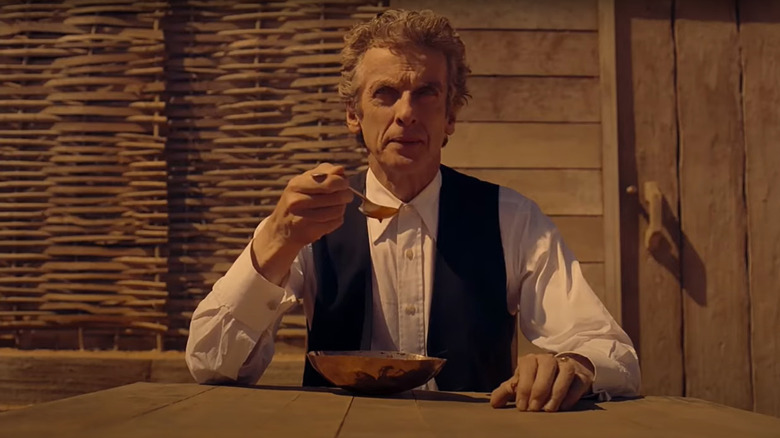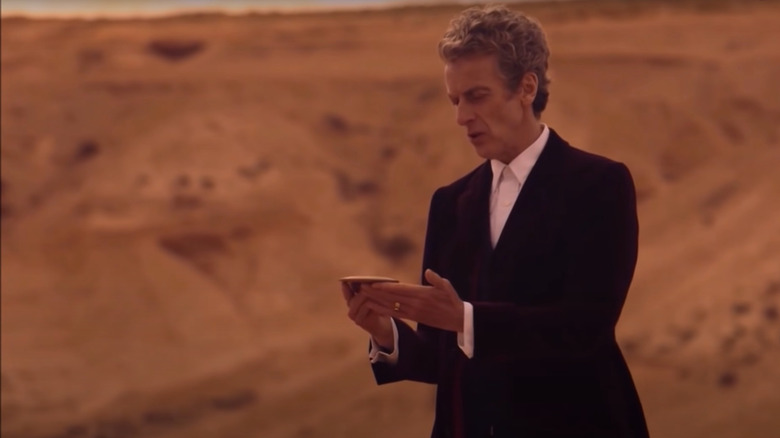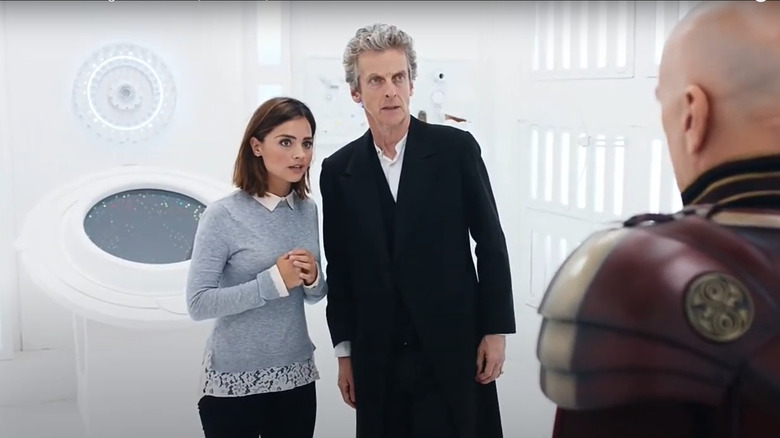The Ending Of Doctor Who Season 9 Explained
Season 9 of "Doctor Who," Peter Capaldi's second in the title role, is considered by many fans to be a classic of the revival era, with some critics hailing it as the strongest season yet. A large number of multi-episode stories allowed showrunner and writer Steven Moffat to explore extended story arcs and themes, as well as greater development of secondary characters and relationships.
Continuing the adventures of the Twelfth Doctor and Clara Oswald (Jenna Coleman), Season 9 saw the return of Missy (Michelle Gomez), Davros (Julian Bleach), President Rassilon (Donald Sumpter), and planet Gallifrey itself. It also featured Maisie Williams in the recurring role of Ashildr, a Viking girl who the Doctor saves from death and makes immortal, subsequently encountering her across time. And if you include the Christmas specials, River Song (Alex Kingston) and Santa Claus (Nick Frost) also made appearances.
Season 9 moves beyond the identity crisis of Season 8 (in which both Clara and the Doctor wondered whether they knew who he "really is") as Capaldi hits his stride in the role and the Doctor-Clara relationship gathers momentum and reaches a new intensity. The season is weaved together by the master theme of the mysterious "Hybrid" prophecy, a melding of two warrior races destined to destroy the universe. The Doctor's pursuit of this mystery once again pits him against the Time Lords, and it leads to a momentous finale in which the Doctor and Clara are bound together ... but obligated to part ways forever.
'Heaven Sent' became an instant classic
The final three episodes of Season 9 — "Face the Raven," "Heaven Sent," and "Hell Bent" — form a closely bound climax and resolution to the season. The penultimate episode, "Heaven Sent," was almost universally hailed by critics as one of the all-time greatest Doctor Who episodes, with an average Rotten Tomatoes score of 9.8. Paste Magazine referred to it as "a masterpiece of the highest order." Stylistically it was unlike anything Who fans had seen before: a cryptic and surreal meditation on grief and mortality, driven by a powerful solo performance from Capaldi in which the Doctor spends an eternity in isolation processing the loss of Clara and facing his own imminent death, all the while struggling to stay alive and keep going.
Before her death at the end of "Face the Raven" Clara pleaded with the Doctor not to take revenge, and the Doctor was subsequently bound and teleported by unknown captors. In "Heaven Sent" he finds himself in a mysterious castle slowly and relentlessly pursued by a grim hooded figure. The episode plays out like an extended riddle as the Doctor tries to unfold where he is, who put him there, and what they want from him. Gradually piecing the clues together, he determines that the whole castle was built for him, with the purpose of interrogation and torture for information about the prophesied Hybrid.
Every time the hooded creature catches up with him the Doctor dies, and a new iteration teleports in to begin again. He deduces that he's already been in this place for 7000 years. With each death, the Doctor gets little closer to escaping, though he knows it'll take a "very long time." After countless deaths and resurrections, he finally leaves the castle to find himself on Gallifrey.
In 'Hell Bent' The Doctor finally comes home and seeks vengeance
"Heaven Sent" gave its follow-up episode "Hell Bent" such a hard act to follow that it seemed almost inevitable the season finale would be an anticlimax. For some, that simply wasn't a concern: Alasdair Wilkins of The A.V. Club wrote "'Hell Bent' could be an unmitigated disaster and it still wouldn't really undo the genius of 'Heaven Sent' or 'Face The Raven' before it."
Finally returning to his home planet of Gallifrey, the Doctor goes to his childhood barn and awaits the Time Lords. The Doctor immediately instigates a coup when the Gallifreyan military refuses President Rassilon's order to kill him due to his status as the war hero who saved their planet in the Last Great Time War. Exiling Rassilon and the High Council, the Doctor takes over as president and learns that he spent four and a half billion years in the castle, where Rassilon had him tortured to gain information about the prophecy of the Hybrid. The Doctor has the Time Lords extract Clara in a suspended state seconds before her death, and absconds with her in a stolen TARDIS.
Refusing to accept Clara's death, the Doctor risks damaging the fabric of time by fleeing with her to the very end of the universe and time itself in an attempt to outrun the Time Lords, and in the ruins of Gallifrey they find Ashildr. When the Doctor plans to wipe Clara's mind to hide her from the Time Lords, Clara turns the tables on him. Ready to accept her death and not wanting to lose her memories of him, Clara has the Doctor wipe his own mind so he can move on after she's gone.
The mysteries of the confession dial and the Hybrid are resolved
The Season 9 opening two-parter "The Magician's Apprentice/The Witch's Familiar" introduced two new concepts: the confession dial and the prophecy of the Hybrid. Thanks to Moffatt's writing they immediately and seamlessly felt part of lore as though they had always been there, and both were developed and resolved by the end of the season.
In "The Magician's Apprentice" Missy informs Clara that she has received the Doctor's "confession dial," which she explains as a Time Lord's last will and testament. This setup is paid off in the season's finale when at the end of "Heaven Sent" the Doctor escapes the prison castle and realizes that he had been trapped in his own confession dial for four and a half billion years. In "Hell Bent" we learn that the confession dial uses Gallifreyan technology to allow dying Time Lords the opportunity to face their demons and make peace with themselves. Rassilon had turned the Doctor's dial into his personal torture chamber to try and extract knowledge of the Hybrid.
Similarly, the prophecy of a Hybrid mix of two warrior races was introduced in "The Magician's Apprentice/The Witch's Familiar." It was predicted that the Hybrid would ultimately destroy the universe and stand in the ruins of Gallifrey. Davros tried and failed to fulfil the prophecy by mixing the Doctor's Time Lord energy with the Daleks. Throughout Season 9 potential candidates for the Hybrid were teased, including Ashildr, the human/Zygon Osgood partnership (Ingrid Oliver), and the Doctor himself.
At the end of "Hell Bent" Ashildr concludes that the Hybrid refers to the Doctor and Clara combined: they are a synthesis of kindred spirits who push each other to more and more destructive actions, with potentially catastrophic consequences.
Season 9 concluded Clara Oswald's historic arc
With a two-and-a-half season run Clara Oswald isn't only the longest-running New Who companion, she was a monumental presence with a profound impact on the Doctor's path and identity. From the very beginning of her journey Clara represented a riddle and a possible threat to the Doctor. Baffled by her recurring appearances in his timeline, the Eleventh Doctor (Matt Smith) invites Clara to join him in his adventures while he secretly continues his investigation of her. Clara's "Impossible Girl" story arc was resolved and explained with her entering the Doctor's timeline to save him in "The Name of the Doctor."
There was an initial distrust between Clara and the Twelfth Doctor, but the pair soon hit their stride as Clara seemed perfectly in tune with the darker tone of Capaldi's characterization. Following the death of her lover Danny Pink, Clara became increasingly reckless, even abducting the Doctor in an attempt to force him to defy the laws of time to bring Danny back. Her death in "Face the Raven" was a direct result of her hubris, attempting to play at being the Doctor while trying to save a friend.
The bond between Clara and the Doctor was perfectly characterized by the Doctor's reaction to her death; resisting torture for billions of years and then going on the run, dangerously pushing the boundaries and refusing to accept defeat. In the end Clara proves to be every bit the Doctor's match, outwitting him and exercising her "duty of care." Having had to live through the grief of losing both her mother and Danny, Clara's goodbye to the Twelfth Doctor is a favor to him, giving him the gift of forgetting so he can move on.
